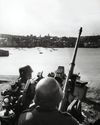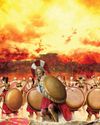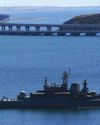Prøve GULL - Gratis
RAF RETURNS TO NUCLEAR
History of War
|Issue 149
Nearly 30 years after giving them up, the RAF is poised to reacquire air-dropped nuclear weapons

The first successful static test of a British atomic bomb, in October 1952, was conducted underwater, but it was always intended that the final weapons would be airdropped by the Royal Air Force.
In October 1956, a Vickers Valiant dropped an atomic weapon, and less than a year later a Valiant dropped a hydrogen, or nuclear, bomb during Operation Grapple. By this time the development of a fleet of bombers (the so-called 'V Bombers' - Valiant, Avro Vulcan and Handley Page Victor) and suitable standoff delivery systems were all well under way.
These aircraft and their nuclear weapons became 'V Force': Britain's nuclear deterrent. They were intended to provide a reactive wave of attacks on the Soviet Union (or other enemies) who had already launched an attack on Britain or NATO. In what was later dubbed 'Mutually Assured Destruction', they provided the ultimate deterrent to an aggressor - the certain knowledge that they too would be destroyed. V Force reached 22 squadrons of aircraft by 1962, while from 1958 to 1963 they were supplemented by 20 squadrons of Thor Intermediate Range Ballistic Missiles. Ground-based but operated by the RAF, the Thor was a difficult weapon. They were relatively short-ranged, took time to ready for use, and the warheads were owned by the Americans. A US officer had to be present and approve any launch, making their use as a rapid-reaction retaliatory system quite limited (although Thor control panels could allegedly be 'hot-wired' in an emergency to bypass the double-key system).
Denne historien er fra Issue 149-utgaven av History of War.
Abonner på Magzter GOLD for å få tilgang til tusenvis av kuraterte premiumhistorier og over 9000 magasiner og aviser.
Allerede abonnent? Logg på
FLERE HISTORIER FRA History of War

History of War
BATTLE FOR THE CHANNEL ISLANDS
In 1945, the Allies were ready with a daring amphibious operation to liberate Jersey and Guernsey by force
8 mins
Issue 152

History of War
THE BOYNE
Three crowns were on the line when two kings met in Ireland on a sweltering summer's day
11 mins
Issue 152

History of War
PARIS DAVIS
This pioneering member of the United States Army Special Forces received long-overdue recognition for his heroism rescuing comrades during the Vietnam War
6 mins
Issue 152

History of War
FALL OF THE SPARTANS
The powerful Greek city-state overreached itself and saw its influence decline as it failed to integrate conquered territories
4 mins
Issue 152

History of War
MASTERS OF THE SKIES
From rapidly evolving roles to new technologies, historian and airpower expert John Curatola discusses how fighter planes shaped the Second World War
9 mins
Issue 152

History of War
TEA WITH TRAITORS
A progressive educator celebrated her birthday with a tea party for dissident friends – unaware that a Gestapo informant was among them
9 mins
Issue 152

History of War
CHURCHILL IN THE TRENCHES
How Britain's future war leader earned respect and redemption on the Western Front
13 mins
Issue 152

History of War
"MORE DANGEROUS THAN THE 1950S"
Do we need to relearn the Cold War's fear of mutually assured destruction in our unregulated nuclear landscape?
3 mins
Issue 152

History of War
CRIMEA IN THE CROSSHAIRS
The Black Sea peninsular has been coveted by rival interests for centuries, with the current Russian occupation motivated by several factors
5 mins
Issue 152

History of War
ON THE BRINK
Any conflict between the US and China would almost certainly see the American mainland come under direct attack
3 mins
Issue 152
Listen
Translate
Change font size

